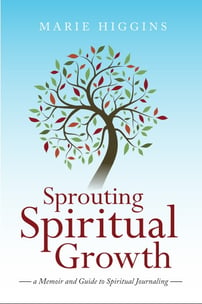I believe God*/Spirit wants to be in our lives, and we can do this easily, with an attention on being spiritual and asking Spirit into our process. If we believe ourselves to be spiritual persons AND we have been doing the practice of spiritual journaling, this column teaches another variation on the practice, allowing us to surround ourselves with Spirit’s wisdom at the beginning and at the close of this practice.
But for those new to this column, let me first provide information about what it could mean to be spiritual and the simplest practice of what I call spiritual journaling. With these foundational pieces, a person new to this process can immediately step into the variation which will also be presented in this column.
So, first, what does it mean to be spiritual? To be spiritual means that a person gives highest priority to being a loving person; specifically, to love people, animals, and the universe. It generally includes beliefs that we are all energetically connected, and that there exists SOMETHING other than what a person can touch, see, or hear.
Spiritual journaling then, is a type of journaling: namely, it is journaling that asks SOMETHING greater than ourselves, SOMETHING other than what we can touch, see or hear, to help us become the most loving person, to ourselves, and everyone and everything else.
So, if today were the first day of practicing spiritual journaling, we would simply write today’s date and then journal about whatever is on our minds or in our hearts. Then, at the end of our active journaling, which is the space after we write about what we set out to write, but before closing our journal, we write this question: God, what else do you want me to know?
And then we listen for an answer. For me, sometimes I hear an answer immediately and I write it down. Sometimes, I wait in silence until an answer comes and I write it down. Not often, but sometimes, I hear nothing, and sometimes I am inspired to use a tool. Tools often include meditation cards, the Bible, a daily devotional, or a spiritual book, such as Nan Merrill’s Psalms for Praying (The Continuum International Publishing Group Inc. 2006).
If you are not sure what to use, use the tool which pops into your head first. It could be the first thing you see, such as a billboard outside your hotel window, or a coffee-table magazine (financial, gossip, etc.; I believe that it doesn’t matter, that God* knows what you see!). Don’t pass judgment; just write down what you see or what you are drawn to read, and the specifics of that reading.
At this writing, I have used the following tools over the past week: 1. Meditation/quiet listening; 2. Cards from Colette Baron-Reid’s Postcards from Spirit; and 3. La Santa Biblia/The Holy Bible Reina Valera Revisada 1960.
This practice listed above is the essence of what I call spiritual journaling.
Now, let’s move on to the variation. Once we have done the above practice at least one time, the next day we can start the variation. So, how do we surround ourselves in Spirit in this process of spiritual journaling? Use these simple steps:
STEP 1: Write today’s date.
STEP 2: Write the following journaling prompt:
JOURNAL PROMPT: God, what did you want me to know yesterday?
STEP 3: Read, reflect and write about what you wrote at the end of your last spiritual journaling entry.
JOURNAL PROMPT: What do I think God was telling me yesterday?
JOURNAL PROMPT: How does this message apply to my life right now?
JOURNAL PROMPT: What should I continue, stop or begin?
STEP 4: Write the following journaling prompt:
JOURNAL PROMPT: God, what else do you want me to know?
This last journal prompt brings us back to the daily practice of quietly listening for an answer or using a tool.
The benefit of this type of journaling is that we can feel surrounded by Spirit, which I have found to often include helpful tidbits about moving in the direction of living spiritually. The simplicity of it is that we are beginning with the last thing written in our journal from the day before, that which God wanted us to know, and starting our current day’s writing about what God wanted us to know.
Here is a recent personal example. On November 19, the following answer surfaced to the question, God, what else should I know:
Like the body, love is complex; unlike the body, love has no failures.
Then, on November 20, I began my journaling session writing about this answer, about the body being complex, and my experience of my body, and its amazing ability to alert me via pain, and to heal via internal and external mechanisms, including the learnings of others. I also wrote about love being complex, and how another showed love in a recent complex situation.
What I enjoy about this variation of spiritual journaling is that I feel surrounded by Spirit the entire journaling session.
So, why not try using this variation for a week, to put a focus on God/Spirit at the beginning of your writing and at the end of your writing? It is a type of journaling that could be called Spirit in the Round! For me, it feels like rapid-fire leaf fall on a windy wintry day in the mid-Atlantic states; however, instead of leaves which come from above and settle below, words of wisdom come in rapid succession starting at the top and the bottom of this journaling time. What a great opportunity to focus on and converse with Spirit during our journaling sessions!
*For this column, I want to define God by not defining God. I suggest that each of us use the term which feels most comfortable. I use God as a universal term. You may decide that Spirit, Great Spirit, Higher Power, Sensibility, Best Self, or SOMETHING else better suits you. It is not for me to decide what term you use. It is only for me to decide which term I use. I often use the term God.

Author bio: Marie Higgins left corporate America after more than 15 years in human resources management to pursue life. Before long she found massage therapy and became a nationally certified, state-licensed massage therapist. At the same time, she felt a partial hardening of the heart, figuratively and spiritually, so she found a spiritual coach to help, and became an active journaling person. Included in her journals are the gratitude lists that helped her heart soften and moved her to write poetry. In 2017 she included these poems in her debut book, Sprouting Spiritual Growth: A Memoir and a Guide to Spiritual Journaling. Since then Marie maintains a journaling practice that includes writing poetry whenever inspiration strikes. Marie lives in suburban Philadelphia with her husband, two young adult children and an active foxhound.
Marie Higgins left corporate America after more than 15 years in human resources management to pursue life. Before long she found massage therapy and became a nationally certified, state-licensed massage therapist. At the same time, she felt a partial hardening of the heart, figuratively and spiritually, so she found a spiritual coach to help, and became an active journaling person. Included in her journals are the gratitude lists that helped her heart soften and moved her to write poetry. In 2017 she included these poems in her debut book, Sprouting Spiritual Growth: A Memoir and a Guide to Spiritual Journaling. Since then Marie maintains a journaling practice that includes writing poetry whenever inspiration strikes. Marie lives in suburban Philadelphia with her husband, two young adult children and an active foxhound.



Leave Comment